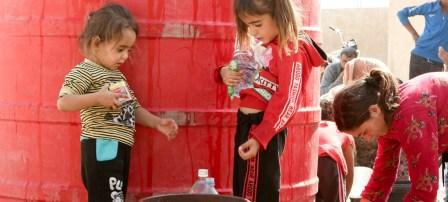
The UN Children’s Fund (UNICEF) and its relief partners in Syria are warning that water disruptions in the country’s war-battered north-east could exacerbate risks posed by the global coronavirus pandemic.
In statement from Damascus, Fran Equiza, UNICEF Representative in Syria, said on Monday that the water supply from the Allouk station – the main source of water for some 460,000 people – has been interrupted
It is the latest in a series of pumping disruptions over the past weeks, he said.
“The interruption of water supply during the current efforts to curb the spread of coronavirus disease puts children and families at unacceptable risk. Handwashing with soap is critical in the fight against COVID-19,” he said.
UNICEF mobilizes against pandemic
Around the globe, UNICEF’s water, sanitation and hygiene programmes are stepping up their fight against the ongoing COVID-19 pandemic. The multisectoral response is being led by the World Health Organization (WHO) at the global level.
In north-east Syria, where many of the families reliant on the Allouk water station live in camps for displaced persons, UNICEF says access to uninterrupted, reliable access to safe water is essential to ensure that residents are not forced to resort to unsafe water sources.
“UNICEF and partners are supporting families in the city of al-Hassakeh and camps for displaced families with water trucking, but this barely covers minimum needs if the water supply is interrupted again,” he said.
Life without water amid COVID-19 outbreak
The supply interruption to the Allouk station is one in a series of service disruptions related to ongoing fighting in northeast Syria.
In an October 2019 statement, UNICEF reported that water from Allouk had been cut off for more than a week amid continued violence in the town of Ras Al-Ain, where the water station is located.
According to the agency, the two main electricity lines supplying power to the Allouk station were damaged by fighting. While technical teams were able to reach the water station, they were not fully able to repair the damage.
Today, Mr. Equiza emphasized the importance of safe water and handwashing – not just in the time of COVID-19, but every day.
“No child should have to live even one day without safe water. Clean water and handwashing save lives. Water and water facilities must not be used for military or political gains – when they do, children are the first and most to suffer,” he said.
Virus threatens lives in conflict zones
As humanitarian workers worldwide brace to shield the most vulnerable from the spread of COVID-19, the international community is demanding more action to protect women, children and others in the world’s conflict hotspots.
Calling for a worldwide ceasefire in a virtual press conference earlier today, UN Secretary-General António Guterres warned that armed conflict continues to rage on despite the expanding risks posed by the pandemic.
“The most vulnerable — women and children, people with disabilities, the marginalized and the displaced — pay the highest price. They are also at the highest risk of suffering devastating losses from COVID-19,” he said, adding that health systems in many conflict-affected countries have collapsed and people displaced by violent conflict are doubly vulnerable.
“The fury of the virus illustrates the folly of war,” the UN chief said.
Source: UN News
https://news.un.org/en/story/2020/03/1060072
 FR
FR EN
EN AR
AR








